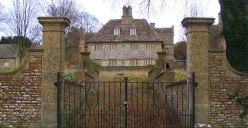Difference between revisions of "RAF Rudloe Manor"
From TheHolo.Net Forums Wiki
m (→Out of Character) |
m |
||
| Line 13: | Line 13: | ||
During the 1930s, the quarries under the site were converted into the Central Ammunition Depot for the United Kingdom. During the Second World War, the Ministry of Aircraft Production built an aircraft engine factory in the tunnels, intended to be used if the factories in Bristol were damaged or destroyed during German air raids. | During the 1930s, the quarries under the site were converted into the Central Ammunition Depot for the United Kingdom. During the Second World War, the Ministry of Aircraft Production built an aircraft engine factory in the tunnels, intended to be used if the factories in Bristol were damaged or destroyed during German air raids. | ||
| − | [[Rudloe Manor]] itself - build from Bath Stone mined in those quarries - was taken over by the Royal Air Force during the War. The manor and the surrounding area became the headquarters for No. 10 Group | + | [[Rudloe Manor]] itself - build from Bath Stone mined in those quarries - was taken over by the Royal Air Force during the War. The manor and the surrounding area became the headquarters for No. 10 Group - including an underground operations centre in Brown Quarry - which was designated RAF Box. A communications centre was also built on the site, staffed by members of the Women's Auxiliary Air Force from nearby Hartham Park. In 1942, RAF Box became home to the RAF Regiment's [[Special Wing]], and became heavily involved in the execution of [[Operation Pelius]]. |
After the Second World War, the site became an important hub of activity across all three services. The nearby Basil Hill Barracks is still the headquarters of the 2nd Signals Brigade, and the Royal Navy operated a training base (HMS Royal Arthur) and a Royal Naval Stores Depot (RNSD Copenacre) until the mid-nineties. The Royal Air Force meanwhile had various communications and training units stationed at RAF Rudloe Manor until it closed in 2000; most notably was 1001 Signals Unit, which ran the spacecraft operations centre ("Hawthorn") for the [http://en.wikipedia.org/wiki/Skynet_%28satellites%29 Skynet] satellite network. | After the Second World War, the site became an important hub of activity across all three services. The nearby Basil Hill Barracks is still the headquarters of the 2nd Signals Brigade, and the Royal Navy operated a training base (HMS Royal Arthur) and a Royal Naval Stores Depot (RNSD Copenacre) until the mid-nineties. The Royal Air Force meanwhile had various communications and training units stationed at RAF Rudloe Manor until it closed in 2000; most notably was 1001 Signals Unit, which ran the spacecraft operations centre ("Hawthorn") for the [http://en.wikipedia.org/wiki/Skynet_%28satellites%29 Skynet] satellite network. | ||
Latest revision as of 15:49, 21 April 2012
Formerly: RAF Box
Known as RAF Box during the Second World War, RAF Rudloe Manor was an important military site in England for nearly seventy years.
During the 1930s, the quarries under the site were converted into the Central Ammunition Depot for the United Kingdom. During the Second World War, the Ministry of Aircraft Production built an aircraft engine factory in the tunnels, intended to be used if the factories in Bristol were damaged or destroyed during German air raids.
Rudloe Manor itself - build from Bath Stone mined in those quarries - was taken over by the Royal Air Force during the War. The manor and the surrounding area became the headquarters for No. 10 Group - including an underground operations centre in Brown Quarry - which was designated RAF Box. A communications centre was also built on the site, staffed by members of the Women's Auxiliary Air Force from nearby Hartham Park. In 1942, RAF Box became home to the RAF Regiment's Special Wing, and became heavily involved in the execution of Operation Pelius.
After the Second World War, the site became an important hub of activity across all three services. The nearby Basil Hill Barracks is still the headquarters of the 2nd Signals Brigade, and the Royal Navy operated a training base (HMS Royal Arthur) and a Royal Naval Stores Depot (RNSD Copenacre) until the mid-nineties. The Royal Air Force meanwhile had various communications and training units stationed at RAF Rudloe Manor until it closed in 2000; most notably was 1001 Signals Unit, which ran the spacecraft operations centre ("Hawthorn") for the Skynet satellite network.
Another major military site at the area was located underground in the old quarries. More than a kilometre long and boasting several miles of roads, a city-sized bunker codenamed Burlington was constructed to house the Royal family, the Cabinet, and up to 4,000 support staff for up to in he event of a nuclear attack. Burlington has a reservoir, power station, laundrette, offices, strategic control centres, and a phone exchange. The base was never used, and it was officially decommissioned in 2004.
RAF Rudloe Manor was closed in 2000. The manor and it's immediate area were sold off to a private party, but the remainder of the base and RNSD Copenacre are still maintained by the Defence Communications Service Agency (DCSA).
Out of Character
Particularly because of the Burlington bunker (the purpose of which was classified until 2004), the base's connections to Skynet and satellite communications, and the abundance of Army and Navy activity in the area as well, many conspiracy theorists and UFO enthusiasts in Britain believe that RAF Rudloe Manor is the UK equivalent of Area 51.


